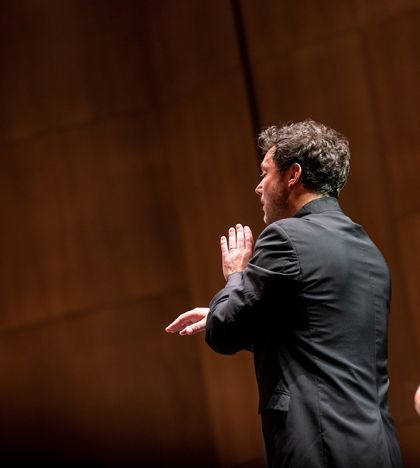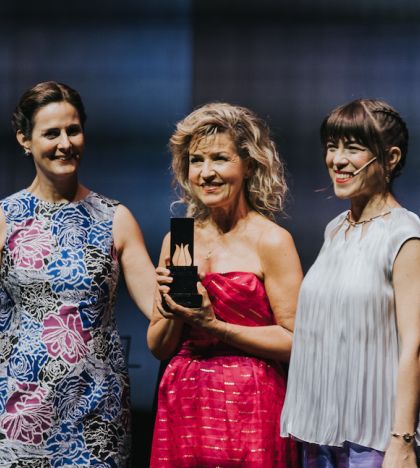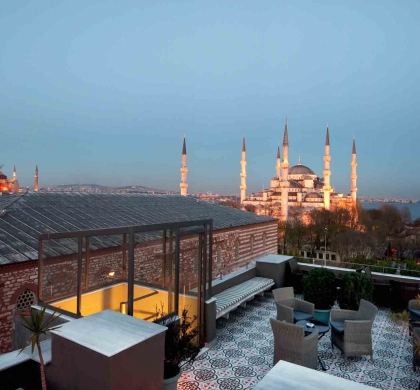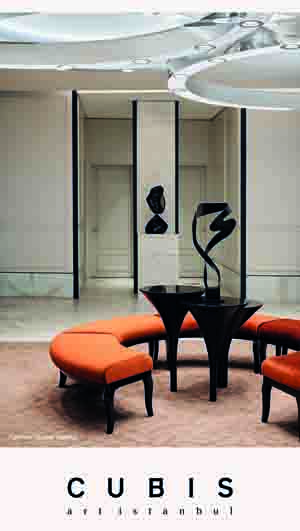Percussionist Can Kozlu, recipient of this year’s Lifetime Achievement Award, joined the İmer Demirer Trio in the last concert of the Jazz Festival (photo: Salih Üstundağ)
Looking back on the summer that was, on July 19 I attended a concert at the Cemal Reşit Rey Concert Hall, the last event in the 2023 İKSV Jazz Festival. It was a breath of fresh air – at last, some real jazz!
First to take the stage after a late start (the proceedings were scheduled to kick off at 7:30, but actually began at 8:05) was Istanbul Jazz Festival Director Harun İzer. He informed us that the concert was to feature three generations of Turkish jazz musicians, beginning with the youngest and ending with the oldest. Then jazz pianist, singer and composer Selen Gülün addressed the audience, informing us that some of the people we were about to listen to were her teachers; others, meanwhile, were her pupils.
The concert began with a set by the İpek Göztepe Quintet, consisting of vocalist İpek Göztepe, Kaan Karadavut on trumpet, Engin Özşahin on piano, Enver Muhamedi on double bass and Mehmet Ali Şimayli on drums. Elif Göztepe began her musical career as a pianist, later becoming a singer of Turkish classical music and branching out into jazz and soul in 2013. Her teachers have included Güç Başar Gülle (for jazz theory) and Randy Esen (the wife of Aydın Esen) for jazz singing; she has also received singing tuition in Austria. This latter connection, of which more anon, is significant.
This was the first time I had listened to this outfit, and I was very favourably impressed – especially in the second number (‘Get Out of Town’): the pianist took off after a quiet start, and there was a long and satisfying trumpet solo that wandered off on its own, ignoring the bass line but in a way that sounded creative rather than mal à propos. There were moments in the set where I thought Ms Göztepe’s voice was a little on the breathy side (I hankered after something a trifle more edgy), but in the fourth number – ‘The Lamp Is Low’ – she finally let rip with some of the powerful singing I had been waiting for.
Here is İpek Göztepe in a selection of jazz standards with a group that includes Mr Gerhard Lutz, the Austrian Consul-General in Istanbul. I had wondered why the opening concert of this year’s İKSV Jazz Festival (which I attended – perforce briefly, after three hours in the dentist’s chair earlier that day) was held in the garden of the Austrian Consulate-General in Yeniköy. Now I know. The notes below the YouTube version of the following video do not tell us much, but at 5:17 Mr Lutz gives a speech in which he enlightens us as to who he is and where the group is playing. If you scroll on to 16:20, by the way, you will hear an ending to the 1932 song ‘Alone Together’, composed by Arthur Schwartz to lyrics by Howard Dietz, that I think works very well.
The İpek Göztepe Quintet was followed by a performance from Selen Gülün and her ‘Blue Band’ – a double bass, a drummer and an array of three saxophonists and a trumpet-player that was later joined by one further trumpet and a trombone. Ms Gülün sat at the piano, occasionally giving directions to the other musicians from there as the ensemble played pieces she herself had composed; the first three were one continuous sequence, without a break. I was put in mind of a concert by the late Frank Zappa (a musician for whom I have always had great respect) that I attended in Manchester in the early 1970s: on that occasion, rather than playing the guitar and singing, he conducted a row of saxophonists. Some of them seemed to be playing loops, and others to be playing in response to his various hand-signals. So I congratulate Gülün, and give her full marks for originality and daring: composers of jazz pieces, especially experimental ones, are a rare breed that needs our encouragement, appreciation and (most of all) preservation.
I found her to be skilled at finding trenchant bass chords on the piano to underpin the other instruments; however, on occasions I found the texture produced by the brass and winds far too thick – a soup of chords that had too much lentil and not enough water. When let loose from the constraints of tonality, the saxophonists and brass-players served up an atonal mix that was, I fear, the sort of thing I would send back to the kitchen. I myself would have asked the cook to liberally dilute the mulligatawny and add a dash of variety – meaning that the instruments needed to be both thinned out (at least two of them could have been entirely omitted) and spaced out more widely so that they were not all playing in the same register. But who knows? On another occasion, the improvised bits might have sounded much lighter, and the chance comings-together of timbres more felicitous. I certainly do not intend to discourage Gülün from continuing on her path, however: I know very well that all improvisation carries a risk. Self-advertising insert: I played the piano with three other musicians and a lady singer from Kazakhstan – our group was called Soyut Boyut (‘The Abstract Dimension’) – during a concert of improvised music at the Akbank Jazz Festival in 2004.
Here is Selen Gülün singing and playing the piano with an all-female group in a piece of her own composition entitled Kim Bilir (‘Who Knows’).
The third outfit to take the stage was, in chronological terms, the oldest – the İmer Demirer Trio, consisting of trumpeter İmer Demirer, pianist Ali Perret, double-bass player Apostolos Sideris and percussionist Can Kozlu. Can Kozlu was the recipient of this year’s Lifetime Achievement Award, which was presented to him before the set began by Mr Bülent Eczacıbaşı, Chairman of the Board at the İKSV. As I mentioned in my preview of the Jazz Festival, in 1996 Ali Perret and Can Kozlu were instrumental (absolutely no pun intended) in the foundation of the now-defunct Jazz Department at Bilgi University. In his acceptance speech, Kozlu drew attention to the vital importance for musicians of live performances as opposed to recordings; this fact, he said, had been brought home in the most brutal possible way during the pandemic, when all concerts were cancelled. (As I remarked in my blog at the time, many musicians were forced to sell their instruments in order to put food on the table.)
This set had a most pleasing ad hoc flavour to it: you never knew – and the impression was given that the musicians themselves did not know – exactly what was going to happen next. It began with Athens-born and Berklee-trained double-bassist Apostolos Sideris playing alone on the stage; while this was ongoing, Can Kozlu sauntered into view and took up his drumsticks, and finally İmer Demirer appeared complete with trumpet and mute. After this trio had entertained us for a while, the trumpeter removed his mute and played us a solo in a very high register; then he retired to the side of the stage and let the drummer take over. After that, the music speeded up; Demirer returned to centre stage and eventually addressed us, thanking the İKSV for their support over 30 years.
The last member of the ensemble to make his appearance was Ali Perret, and as soon as he sat down at the piano he played a chord that had what I can only describe as ‘bite’. This was a slow number, and after a few minutes the other musicians disappeared, leaving him to it. This allowed Mr Perret to give a demonstration of improvised playing of a quality I have rarely seen in Turkey: he proved himself to be quite capable of holding his own as a soloist without a script of any kind. Indeed, it was the element of improvisation that I found so refreshing in this concert, and I must congratulate the other members of the ensemble, too, for their talent in this department: all the performers showed sensitivity to what their fellow-musicians were playing, being skilled both at finding appropriate accompaniments to it and at suggesting side roads down which it could be taken. All in all, this concert was an outstanding celebration of musical diplomacy and taste.
İmer Demirer is a musician who never fails to please. Here are some tracks from his 2009 album ‘You, Me & Char’, produced by Gloss Musik GmbH, a Berlin-based independent record label. Piano and keyboards are played by Serkan Özyılmaz, double bass by Matt Hall, and percussion by Cem Aksel. First, ‘Chesney’:
Now, ‘Monday Morning’:
And finally, ‘Railroad’:
For the last number in the concert, İpek Göztepe and Selen Gülün returned to the stage, as did some of the instrumentalists we had seen earlier. The resulting co-operation achieved the difficult balance of being both friendly and professional, thus creating an atmosphere that was entirely appropriate for the ending of a jazz festival.
While I have in the past lamented both the paucity of real jazz in the 2023 İKSV Jazz Festival and its replacement by eardrum-thumping (readers may remember that I described the concert by Malian singer Fatoumata Diawara as a ‘hard rock Ragnarok’), I must express my sincere gratitude to the İKSV for providing us with this plentiful dollop of high-quality jazz, albeit somewhat late in the day. The last event of this year’s festival gave some of Turkey’s young jazz musicians, of whom there are thankfully a great many, a chance to showcase their talents, and it finished with an exhibition of genuine artistry.

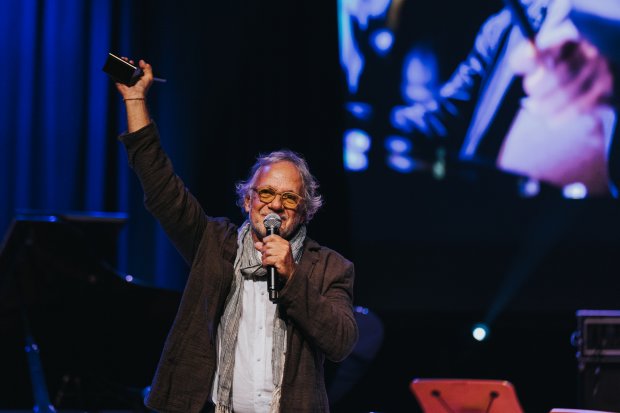

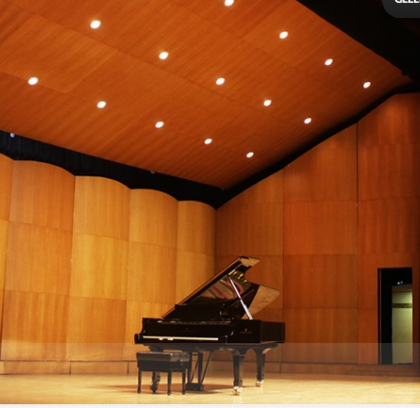
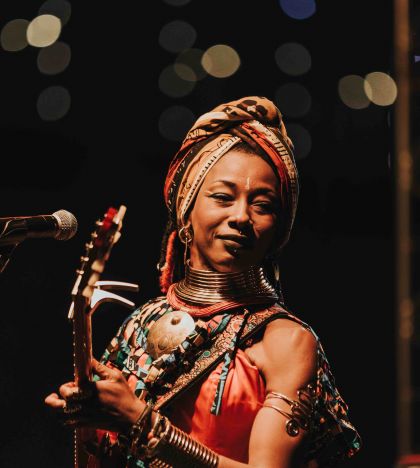
_SalihUstundag_20230706_74_420_468_80_c1.jpg)
